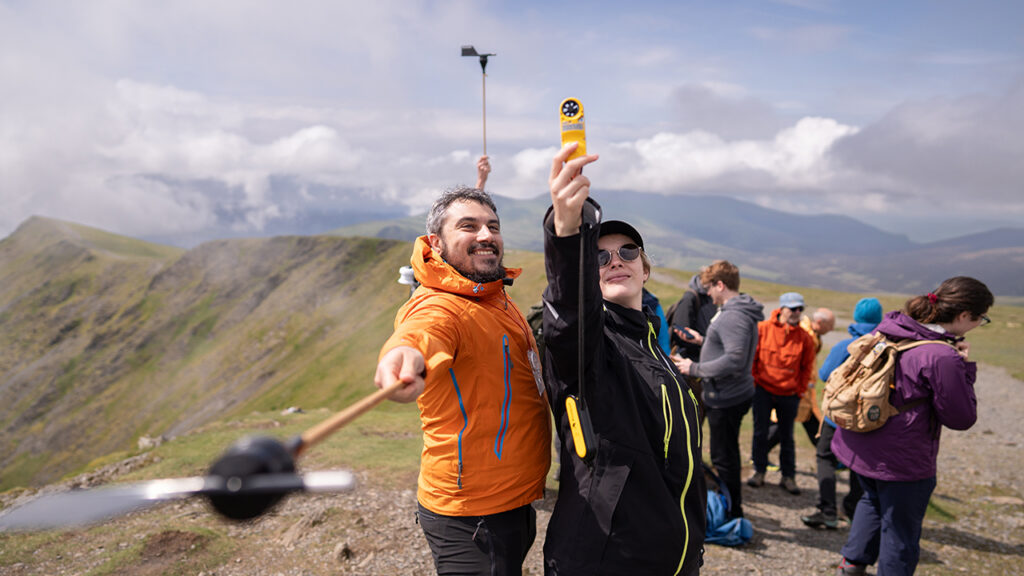
PhD studentship programmes
The National Centre for Atmospheric Science is partnered with several different PhD studentship programmes across the UK.
The current doctoral training schemes we are involved in are:
CREATES led by Cambridge: The Cambridge Research Experience and Advanced Training for Environmental Scientists (CREATES) NERC Doctoral Landscape Award (DLA) unites the University of Cambridge and the British Antarctic Survey as hosts for PhD training and projects, working with a wide range of collaborative partners. Its aim is to nurture and train environmental scientists from a variety of backgrounds, creating diverse cohorts of interdisciplinary, problem-solving environmental science postgraduates qualified to take up a broad spectrum of careers.
ILESLA led by Oxford: The world faces unprecedented challenges, from climate change and food security to infectious diseases, biodiversity declines and sustainability. The Interdisciplinary Life and Environmental Science Landscape Award (ILESLA) will train a new generation of creative, collaborative and entrepreneurial researchers who are equipped to meet these complex, cross-disciplinary challenges. These future leaders will have the knowledge and skills to generate innovative solutions that integrate science across BBSRC and NERC remits, and to conduct curiosity-led research that generates far-reaching insight into biological and environmental systems, and their interactions.
IGNITE led by Southampton: IGNITE is a NERC Doctoral Landscape Award (DLA) that aims to develop the next generation of researchers with the skills to lead our responses to climate change and other environmental challenges and meet the needs of business, government and society.
IGNITE provides funds for PhD studentships. It enables postgraduate researchers to deliver cutting-edge research by immersing them in world-leading research teams and providing access to state-of-the-art equipment and facilities. IGNITE provides an innovative and flexible training programme that develops research, technological and professional skills, allowing researchers to follow a diversity of career paths.
CROCUS led by Reading: CROCUS stands for “NERC Climate system and biodiversity science for Challenges, Risks, and Opportunities – Collaborating in Understanding and Solutions”. It is a partnership is led by the University of Reading with Swansea University, UKCEH, BGS, NOC, Kew, NHM, IoZ, NCAS and NCEO. Climate extremes and biodiversity loss have impelled governments and businesses worldwide to adopt ambitious Net Zero, adaptation, and restoration plans. The environment sector is developing rapidly to design, realise, and evaluate these plans, using cutting-edge science, innovation, and big data. Therefore, to help address the most pressing environmental challenges facing society, CROCUS aims to train a new generation of environmental scientists.
ARIES led by East Anglia: ARIES (“Advanced Research and Innovation in the Environmental Sciences”) was launched in 2018 with funding from the Natural Environment Research Council (NERC), and has been renewed in 2025 with funding from the BBSRC-NERC Doctoral Landscape Award. It draws together expertise from five universities and nine research centres, as well as over forty other research-users. Our partnership has a mission to train postgraduate research students (PGRs) with excellent potential from across society, equipping them with the necessary skills to become 21st Century Scientists: leaders in the science and sustainable business of the natural environment.
E5 led by Edinburgh: The E4 and E5 Doctoral Training Partnerships bring together a network of partners to provide a world class research and training centre, attracting the most talented students to conduct frontier research in environmental sciences. Under E4, the programme collaborated with 32 local partners. with the launch of E5, our network has expanded to include additional partners, further enhancing our capacity for innovative training and research opportunities.
YES-DTN led by Leeds and York: The Yorkshire Environmental Sciences Doctoral Training Network is a collaboration between the University of Leeds and the University of York and provides funding and training for PhD students in the environmental sciences. We represent all science within the Natural Environment Research Council (NERC) science remit at the University of Leeds and the Wolfson Atmospheric Chemistry Laboratories in York. YES-DTN is funded through a BBSRC-NERC Doctoral Landscape Award (DLA). We will recruit up to 26 fully funded PhD candidates per year. The collaboration of 4 academic schools at the University of Leeds and the Wolfson Atmospheric Chemistry Laboratories at the University of York allows YES-DTN to cover the full scope of environmental science research facing the UK Natural Environment Research Council (NERC).
UNRISK led by Leeds: UNRISK will train students with the multidisciplinary knowledge and skills across climate science, data science and decision science to tackle the pressing challenge of reducing the risks associated with rapid climate change.
Intelligent Earth led by Oxford: Intelligent Earth brings together academics from key environmental science and AI departments across Oxford with non-academic partners to train a new generation of DPhil (PhD) students to tackle some of the most pressing environmental issues using AI through five closely connected themes.
EPSRC Centre for Doctoral Training in Net Zero Aviation led by Cranfield): The EPSRC Centre for Doctoral Training in Net Zero Aviation is a collaboration with Cardiff and Strathclyde Universities and the National Centre for Atmospheric Science, and will be delivered in partnership with industry, training 64 students and driving research into novel, disruptive solutions that will decarbonise aviation. The work of this centre will help deliver the UK’s Jet Zero and the ATI’s Destination Zero strategies and help establish the UK as an international hub for technology, innovation and education for net zero aviation.
EPSRC Centre for Doctoral Training in the Mathematics for our Future Climate – Theory, Data and Simulation: The MFC CDT will train 90 highly skilled mathematicians to become future leaders in innovative research, developing environmental prediction technologies, interpreting very large datasets relating to the Earth system, and modelling the risk associated with extreme weather and climate change.
